Acne scars can be atrophic (depressed) or hypertrophic (raised), including various subtypes that develop when the skin heals from a severe acne breakout. These scars form due to inflammation of acne blemishes, which include pimples and cysts. According to research, a high percentage of people aged between 11 and 30 do get acne. And most of those acne sufferers develop acne scars.
While acne scars are not a health risk, they can negatively affect body aesthetics, especially when they develop in visible body areas. Based on their prominence on the skin, these scars can harm an individual’s self-esteem and psychological health. People with acne scars often have a low quality of life and poor body image.
Table of Contents
What Causes Acne Scars?
During an acne breakout, the deeper layers of the affected skin become inflamed, causing damage to dermal tissues. This triggers the body’s immune response, resulting in either insufficient or excessive collagen production to repair the damage. Overproduction of collagen results in raised scars, whereas underproduction causes depressed scars or indentations.
It is important to note that the visibility of an acne scar depends on the depth of inflammation of skin tissues. The deeper the inflammation, the more prominent will be the acne scar.
Certain factors can increase the risk of acne scars, such as:
- Being male
- Family history of acne
- The severity of acne breakout
What Are The Types Of Acne Scars?
An acne breakout can leave behind the following types of acne scars:
- Ice-pick scars – narrow, deep-pitted scars
- Rolling scars – wider depressions with sloping edges
- Boxcar scars – wider depressions with sharp edges
- Atrophic scars – thin and flat or depressed scars
- Hypertrophic scars – raised, lumpy growths due to excessive collagen production
- Keloid scars – Keloid scars are a type of hypertrophic scarring that extend beyond the original wound boundary, often requiring specialized treatment.
Acne Scar Treatments
Acne scars can often be significantly improved or mitigated, though not always completely ‘cured’. Several treatment options exist to reduce their appearance. The effectiveness of these options depends on the type and severity of the scars. Therefore, proper diagnosis and treatment selection is necessary for best results.
Treatments for acne scars in Dubai include the following.
Chemical Peels
Chemical peeling treatment can be performed in both clinical and non-clinical settings, depending on the peel’s strength The purpose is to exfoliate the top skin layer, removing acne scar tissues. This results in reduced visibility of scars.
Trichloroacetic acid, or TCA peels are commonly used for medium-depth peeling, while other types, such as salicylic acid, may be used for superficial peeling, depending on the scar type and skin condition.
That said, you may still need multiple sessions of chemical peeling treatment to get satisfactory results.
Microneedling
Microneedling or collagen induction therapy is a minimally invasive treatment that uses ultra-fine, short needles to create tiny punctures in the skin. These punctures or minor wounds trigger the body’s healing response, stimulating collagen production. Microneedling is primarily an anti-aging treatment that, according to evidence, may also help reduce the visibility of acne scars.
Laser Resurfacing
Laser resurfacing, or laser peeling, is an ablative treatment that reduces the appearance of acne scars by removing tissues from the skin’s top layer. This helps reveal a newer, more rejuvenated skin surface with an even skin tone and texture.
Soft Tissue Fillers
Indented scars may be treated with soft tissue fillers containing fat or collagen. This treatment can reduce the scars’ appearance significantly. However, its results are temporary. Therefore, you will need repeat sessions to maintain the results.
Microdermabrasion
Microdermabrasion uses a hand-held device that sprays tiny crystals onto the skin. These crystals perform a sand-blasting-like function, removing dead skin cells to reveal a fresh skin layer and reduce the appearance of acne scars. This treatment also stimulates collagen production and may improve the appearance of depressed scars.
PRP(platelet-rich plasma)
PRP (platelet-rich plasma) may be effective in treating acne scars, particularly when combined with other treatments like Fractional CO2 laser resurfacing, Microneedling, and Subcision. It typically helps manage atrophic scars, a form of depressed acne scars.
Dermal Fillers
Dermal fillers are an injection-based treatment that can help to fill depressed acne scars. Dermal fillers can temporarily improve the appearance of atrophic acne scars by adding volume to the depressed areas. The most common dermal fillers used for treating acne scars include:
Autologous Fat Transfer
Autologous fat grafting is a procedure that involves transferring fat from one part of the body to another, and it’s a more involved process than injecting pre-made dermal fillers. During this procedure, a surgeon harvests fat from fat-rich areas of your body, processes and purifies it to remove impurities, and injects viable fat cells into the depressed areas of acne scars.
Once injected, those fat cells redevelop, smoothening the skin. However, the percentage of redeveloping fat cells may vary from person to person. Some people may need multiple sessions of autologous fat transfer to achieve the desired results.
What Are The Benefits Of Acne Scar Treatment?
Acne breakouts can leave behind prominent scarring, which can be unsightly and may lower self-esteem. And the worst part is that they can be permanent. Fortunately, you don’t have to live with this nightmare for the rest of your life, as several acne scar treatments are available to help you get a smooth appearance.
Acne scar treatments offer the following benefits:
- They are safer and more effective than ever.
- Most acne scar treatments are non-invasive or minimally invasive and cause little to no pain.
- Aside from a few exceptions, most treatments lead to a shorter recovery duration and almost no downtime.
That said, getting acne scar treatment from a skilled practitioner is essential to avoid risks and prevent complications.
How Long Do The Results Last?
Most treatments offer long-term or even permanent results. However, The duration of results from dermal fillers can vary widely, from several months to a couple of years, depending on the type of filler used. It is pertinent to note that some acne scar treatments aim to reduce the appearance, while others can help remodel the skin structure to diminish the scars. The degree of scar reduction will vary based on several factors, including the type of scar, individual skin characteristics, and the specific treatment regimen.
Before & After Results
The final results will take some time to appear and the duration depends on the severity and type of scars. However, the results will be long-lasting. No Guarantee, as the results may vary from person to person.
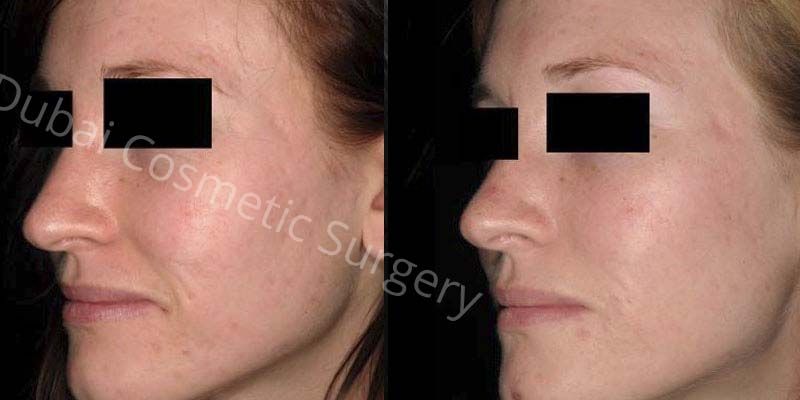
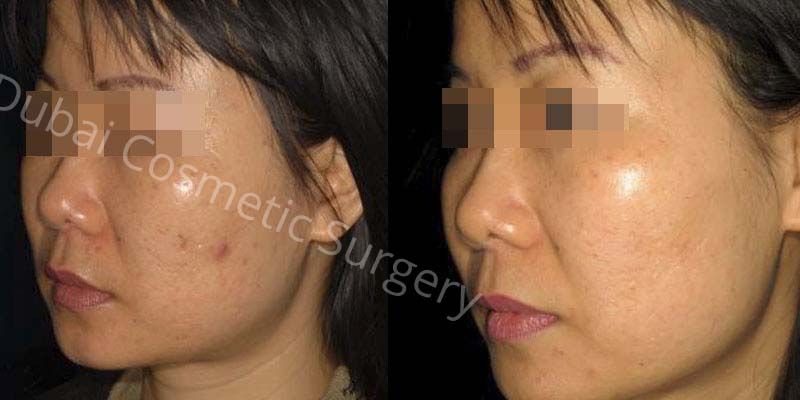
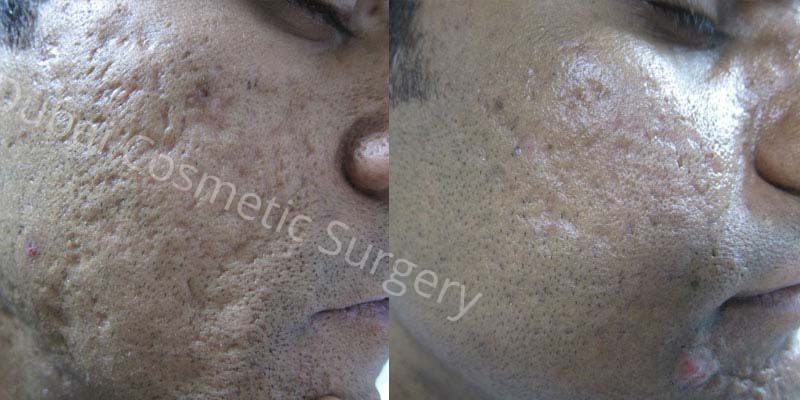
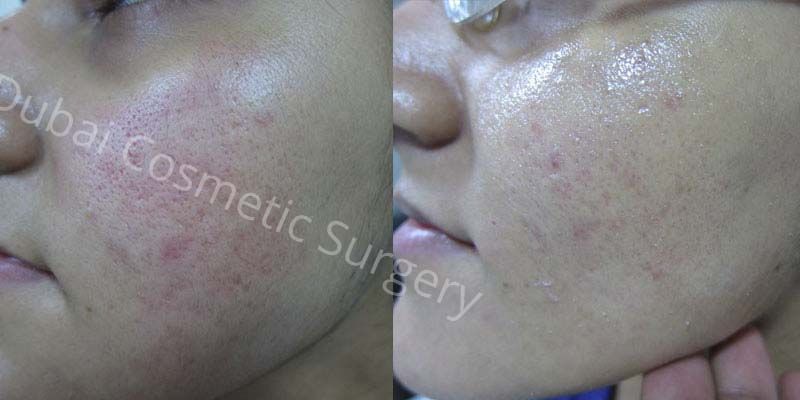
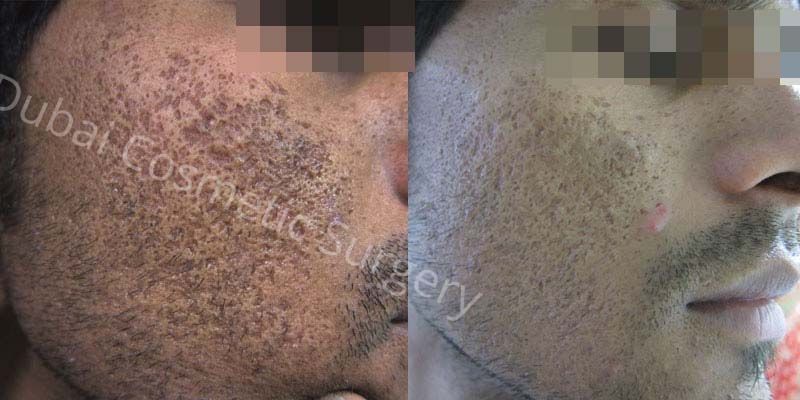
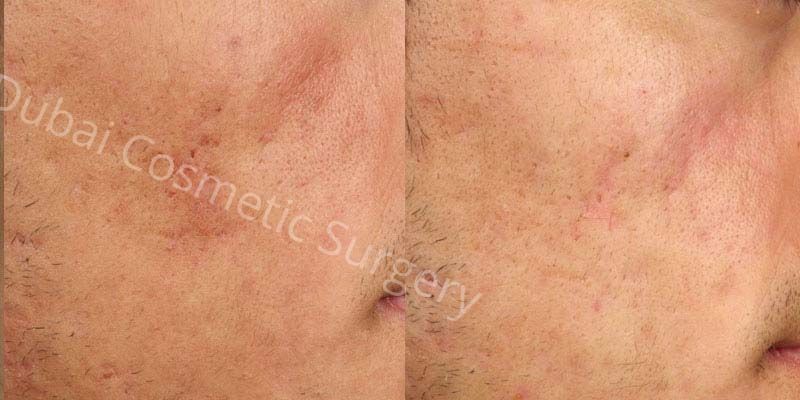
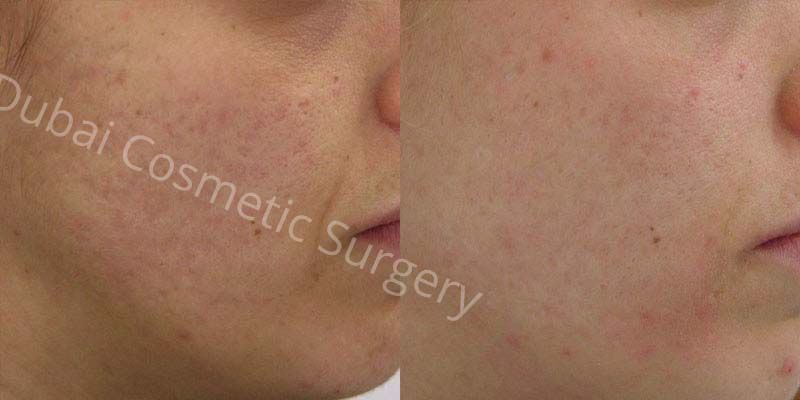
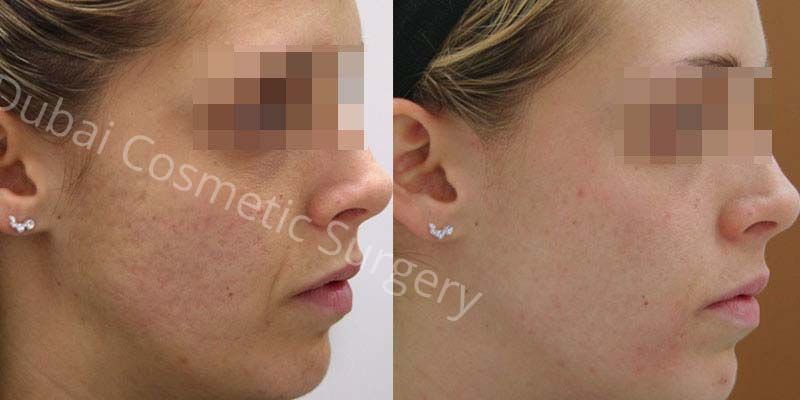
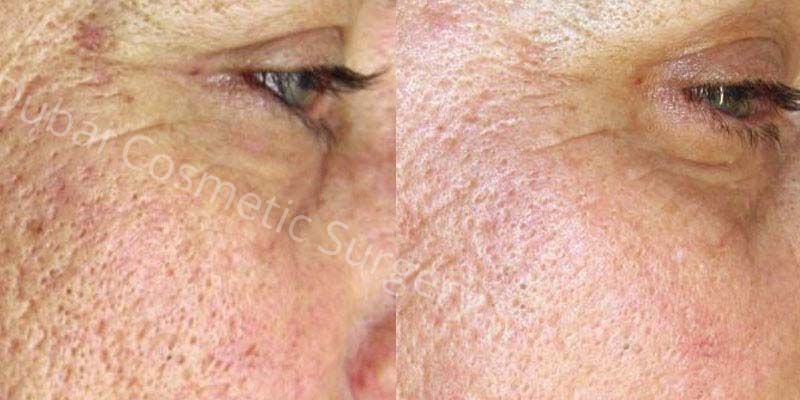


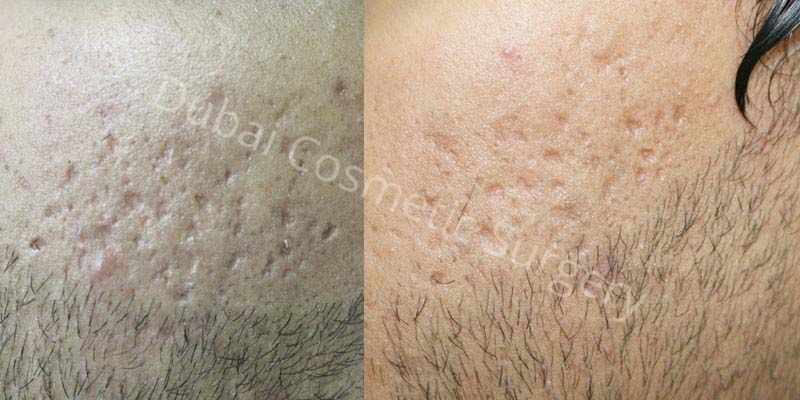
Acne Scar Treatment Cost
The average starting cost of acne scar treatment in Dubai is around AED 1000. The exact treatment price can vary from person to person, depending on the factors listed below:
- The treatment area size
- The severity or prominence of scars
- The treatment method chosen
- The dermatologist’s expertise
- The location and reputation of the treatment facility or clinic
Our Doctors
Acne Scar Treatment FAQs
Which Acne Scar Treatment is Best for Me?
We offer numerous professional acne scar treatments to help you get rid of embarrassing acne scars. These include microdermabrasion, chemical peels, dermal fillers and fractional CO2 lasers. All these are really effective but determining which treatment will be best for you is the job of your dermatologist.
Can Acne Scar Treatment be undergone while still having active acne?
To get the most out of your acne scar treatment, it is always advised to first get the active acne under control. Treating active acne is important because the presence of acne scars on your face shows that you have a skin type that is prone to scarring.
If acne is not controlled, new acne breakouts can cause new scars, thus ruining your and your dermatologist’s all scar removal efforts.
Is Fractional CO2 Laser Skin Resurfacing Right for Dark Skin?
Generally laser therapy is efficient for people with fair complexion. However, with advancement in laser technology, dark skin tones can also be treated with Fractional CO2 laser skin resurfacing.
Book a Consultation
Dubai Cosmetic Surgery Clinic has a state-of-the-art treatment facility with top-rated cosmeticians and clinical experts who provide exceptional acne scar treatment to help you regain your spotless appearance. So, book a consultation today and begin your journey towards a rejuvenated self.
For details, please call +971 4 348 5575. If you want to book a consultation online, please fill in the form below.
Fill in the form to get a consultation
100% Financing with 0% Interest

